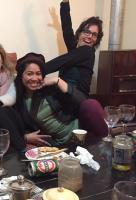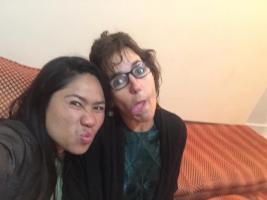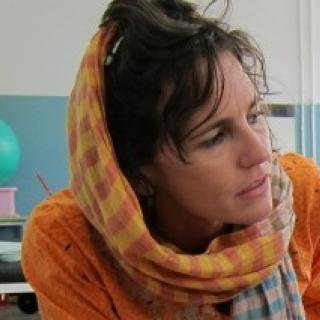Lorena Enebral Perez was born in Segovia, Spain, on 12 January 1979. After finishing school, she studied physiotherapy, completing a bachelor’s degree in 2001 at Alfonso X El Sabio University in Villanueva de la Cañada, near Madrid. She then worked as a physiotherapist in health-care centres in and around the Spanish capital, focusing mainly on early-stage treatment for children with physical or learning disabilities.
In 2005 and 2006 Lorena studied at Chile’s National Rehabilitation Institute Pedro Aguirre Cerda in Santiago. She specialized in the Bobath approach, a treatment used to increase mobility in children with cerebral palsy. Returning to Spain, she joined the early-care centre Conmigo in Pozuelo, just outside Madrid, again working with children with disabilities. She loved being with children, and they loved being with her. Colleagues said she had a way of connecting and communicating with them – even those with severe physical and cognitive disabilities – that was “magical”. It was a special gift.
In 2010 she completed a physiotherapy expert course at Rey Juan Carlos University, Madrid, specializing in Vojta therapy, a treatment aimed at stimulating movement in patients. That same year she also had her first experience of working in the field when she volunteered with África Directo, a humanitarian aid organization. Her first assignment saw Lorena spend a year (May 2010 to April 2011) working in the physiotherapy department at Alinafe Community Hospital, Nkhotakota District, Malawi; she worked on the hospital wards, developed the rehabilitation service and trained staff. In 2012, with another aid organization, she spent two months in Mauritania, volunteering in a physical rehabilitation centre for children with disabilities. She then returned to África Directo and a two-year mission (2013–2014) in northern Tanzania at the Mama Kevina Hope Centre for children with disabilities in the town of Same. As senior physiotherapist, Lorena was responsible for improving the accessibility and quality of rehabilitation services.
By now she was convinced her future lay in the field, ideally in crisis settings, where she felt her skills were needed most. And her heart was set on the ICRC, which she joined in February 2015. Her first assignment was to Ethiopia where she supported three physical rehabilitation centres for adults and children, mainly in the Amhara region. Her commitment, professionalism and unbridled enthusiasm shone from the start, rubbing off on those around her whether ICRC colleagues, patients or outside partners. She adapted quickly to her new environment, rising to every challenge, always moving forwards, brimming with positivity and purpose, and embracing everyone with her smile.
For her next ICRC assignment, in May 2016, Lorena requested Afghanistan where she could once again focus on children with disabilities. Many of those attending ICRC physical rehabilitation centres in the country are children with cerebral palsy. Supervising three centres – in Mazar-i-Sharif, Herat and Jalalabad – Lorena threw herself into her work, motivating, improving, always trying to provide “her” children and their families with the best possible service. Her energy was boundless, hitting the gym every morning, running, sharing meals, and cajoling family and friends to raise funds for this clinic or that school. She radiated warmth, goodness, laughter and life, dusting everyone she met with some of her magic.
What she was doing in Afghanistan meant so much to her that she agreed to extend her one-year mission. However, on 11 September 2017, while working at the ICRC’s physical rehabilitation centre in Mazar-i-Sharif, Lorena was shot by a patient in a wheelchair. She died from her injuries shortly afterwards. She was 38.
The Spanish government posthumously awarded Lorena the Grand Cross of the Order of Civil Merit for her humanitarian work. And in September 2018 the town of Pozuelo, where she had lived, marked the first anniversary of her death by unveiling a plaque in her memory in a children’s playground that now bears her name.


